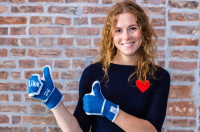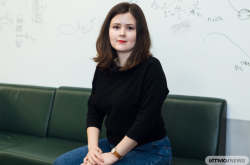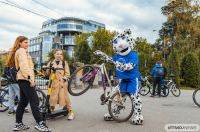How do you spend your summers?
I work for most of the summer. So, while it might sound strange, I spend most of the season here.
And when you were a student?
When I was in university and in school before that, I spent my summer vacation at sports camps. For me, summer was a time for training, at least before I left behind my sports career. Back then I was into professional skiing, and so in the summer I mostly focused on body conditioning. And then I started working during the summer to save up for my first car.
Tell us about your first proper vacation.
That would have been when I defended my PhD and went on a trip to Montenegro. I thought: “I’m a totally free person and I’ve got my whole life ahead of me”.
So if you spend the summer at work, when do you go on vacation?
During the ski season, usually. Mountains and snow are a must, and most of the time I take the last couple days of December and the beginning of January off. I only rest a bit in summer: a week or so in August or July. I once went skiing on a glacier in Austria in July, but the snow just isn’t the same. Although it was a great experience: you ski among the slopes in the morning, and in the evening you’re swimming in a lake.
What do you read on vacation?
I always plan ahead what books I’ll take; most of the time it’s either something work-related or something I didn’t have time for because of work. One time, I took a book called “The History of the Computer Technologies Department”. It’s about how our Rector and Prof. Parfenov came to our university, which was then called LITMO, and how they worked here. It was a gift from Vladimir Glebovich (Parfenov – ed.), and I really liked it. This year he gave me a second book from this series, and I suppose that’s what I’ll be reading on my next vacation.
Is there some kind of summer activity you haven’t tried yet, but would like to?
I really want to hike 200 kilometers on foot. In Spain and Israel, they’ve got all the conditions for that. You walk throughout the day and sleep at rest spots. On the one hand, it’s great physical activity, and on the other, it’s a great opportunity for thinking. When you’re driving, you’re focused on one thing, but it’s different when you just walk and walk. It’s incredible, and I’d like to spend a week of my life doing just that.
Do you have any summer traditions?
Frying koryushka (smelt fish)… Although that’s more of a spring tradition, it’s our way of opening the summer season. In the summer, we also go picking mushrooms, as some of my friends enjoy it just as much as I do.
What was your most memorable summer adventure?
I once went with friends to Sicily and we ended up getting into the wrong car at the airport, which we only realized when we got to the hotel. We found it hilarious: we were so eager to get to our rooms after a long flight and ended up at the opposite end of the island.
Is a business trip different from a regular one? How?
It is! One hundred percent different. I can never relax on a business trip; there’s always a tight schedule, lots of information to review, and to add to this there’s all the early meetings and the jet lag. I often organize work trips not just for me, but for a whole team, which puts even more responsibility on my shoulders. It’s different when you’re on holiday. I love that feeling when you get on a plane and realize that today you’re going on vacation. The only thing that’s the same for me in both cases is that I always run in the mornings.
How much do you run and where?
In St. Petersburg there are many parks where you can run. I usually run 10 to 12 kilometers. My favorite running spot is on the shores of the Mediterranean in Tel Aviv. When I’m there, I run 20 kilometers every morning.
Has there ever been a time that a business trip became a vacation?
Last year we went to Arizona for the meeting of ITMO’s International Council, and it so happened that we had two days off. We all rented a car and explored the state. Arizona is incredibly beautiful; it might just be the best part of America. There are many other great places besides the Grand Canyon that are worth visiting. We took in the nature while also talking about the things we didn’t have time for here, at work: our development strategy and long-term goals. Although those days off, too, became about work, it was the kind of work you enjoy. As our Rector puts it, “you shouldn’t love being a part of the university, but the university being a part of you.”
This interview was originally taken by Anastasia Petrova for Megabyte Media.






